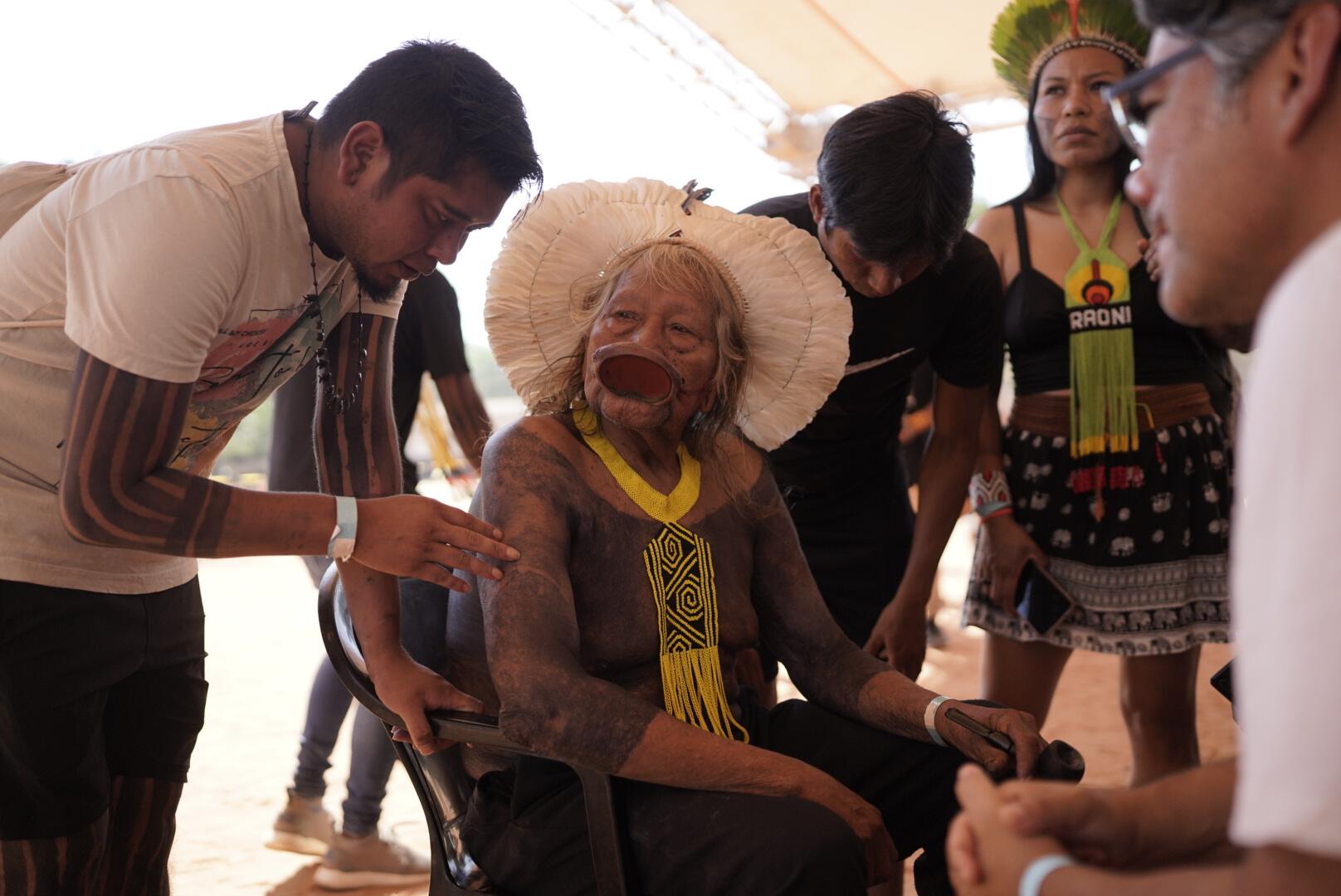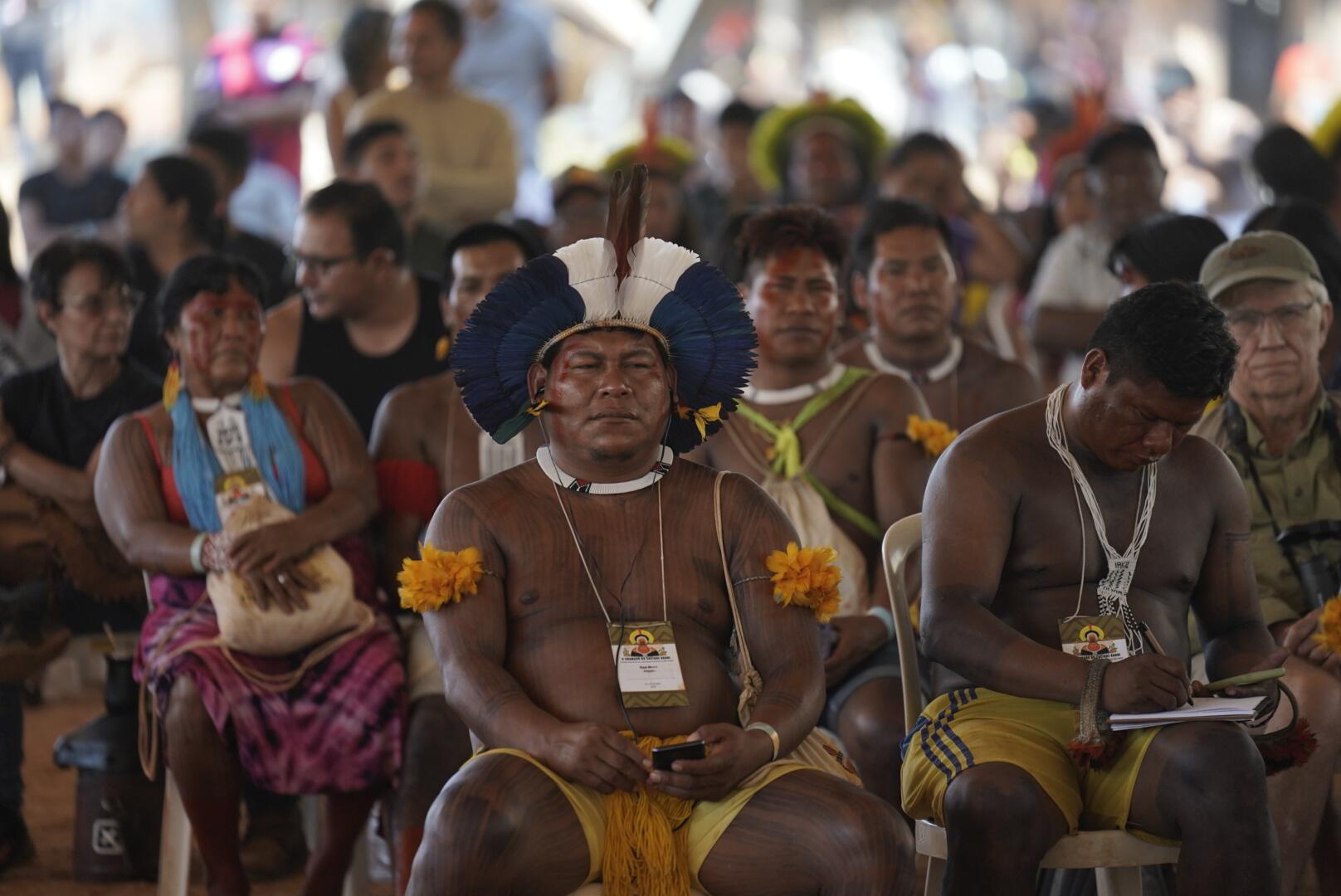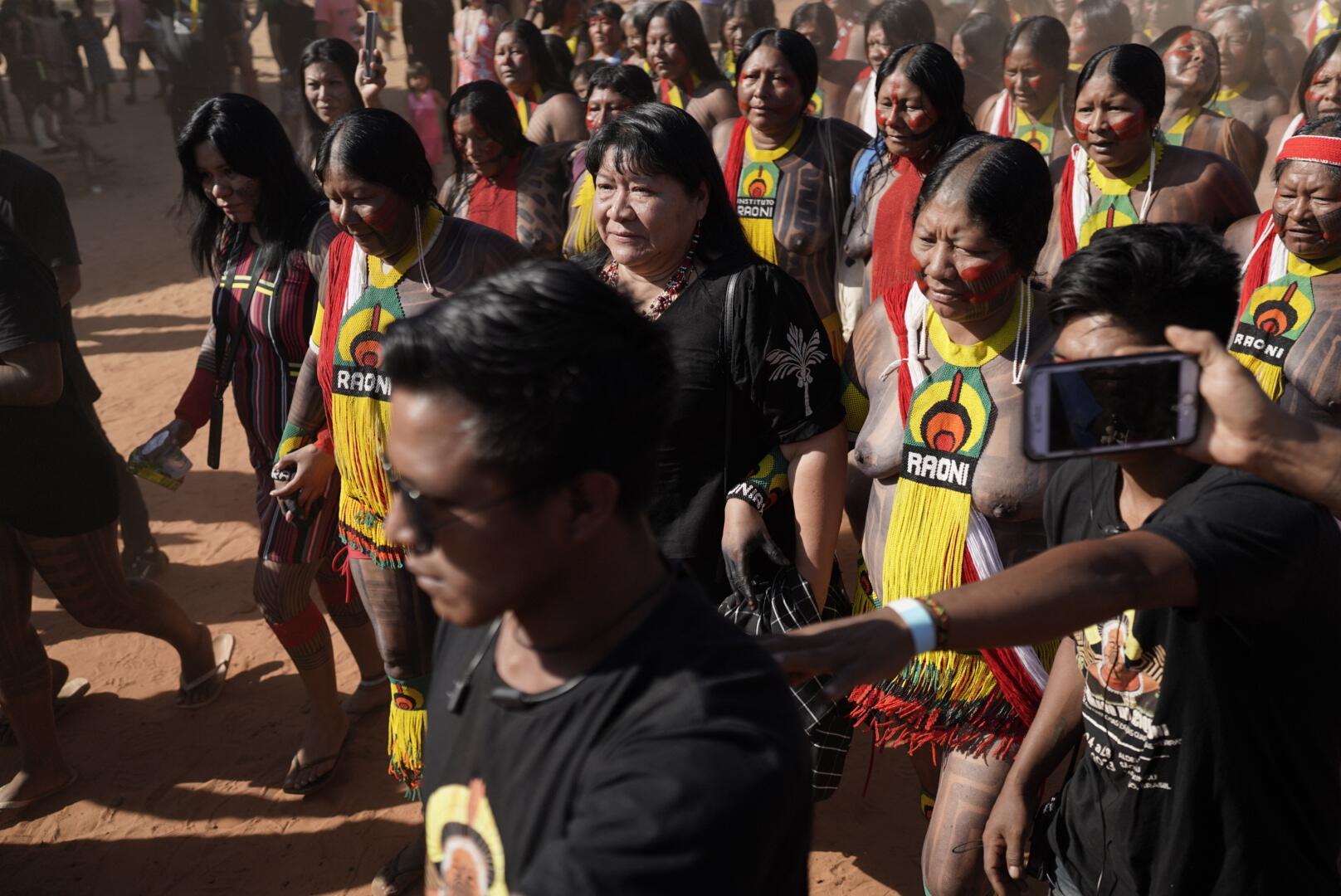In a direct message to President Luiz Inácio Lula da Silva, who was conspicuously absent from the gathering convoked by Cacique [chief] Raoni Metuktire, representatives of 54 Indigenous peoples from across Brazil released a letter this Friday, July 28. The leaders came from all six Brazilian biomes—the Amazon, Cerrado, Caatinga, Pantanal, Atlantic Forest, and Pampa—to meet in Aldeia Piaraçu, in the Amazon state of Mato Grosso. They are demanding that the State respond to such issues as demarcation, desintrusão [removal of intruders from Indigenous territories], the cancellation of carbon credit contracts involving Indigenous peoples, and the rejection of the so-called Cut-off Point thesis. They set a tight deadline for a response: this coming August 9, International Day of the World’s Indigenous Peoples.
“Cacique Raoni answered your call. When will you answer ours?” reads the final paragraph of the letter. This is a reference to Lula, founder of the Workers’ Party, who invited Raoni, Brazil’s most prominent Indigenous leader, to walk up the ramp with him at the Palácio do Planalto in January, when the president took office for his third term. The cacique of the Mebêngôkre people—also known as the Kayapó—accepted Lula’s invitation and traveled to Brasília in a show of support. The idea of Raoni accompanying the president at the inauguration came from the president of the National Foundation for Indigenous Peoples (Funai), Joenia Wapichana, she said in an interview with SUMAÚMA.
Months later, also in Brasília, during the annual Free Land Camp, the 90-year-old Indigenous leader extended his own invitation, asking Lula to attend the event held this week, which Raoni baptized “Cacique Raoni Metuktire’s Call to Action: Great Gathering of Guardian-Leaders of Mother Earth.” According to Raoni’s direct aides, Lula promised he would go. But he didn’t—and this didn’t go over well, even though Lula’s justification was treatment for hip arthrosis.

Raoni’s summons to this gathering may be the stage where he announces who will succeed him as leader of his people. President Lula was invited but is not expected to attend. Photo: Pablo Albarenga/SUMAÚMA
Lula’s absence irritated Raoni, as well as most of the leaders of the Indigenous peoples. The gathering, which ends this Friday, may be the setting where the great Indigenous political leader of the Kayapó announces his successor as head of his people. This is one of the reasons Raoni wanted Lula there.
The head of the “white men’s” Executive Branch isn’t the only target of the Indigenous leaders’ dissatisfaction; Brazil’s Federal Supreme Court and its Congress were also called to action in the letter. “[We] demand that the Brazilian State take a concrete stance regarding Extraordinary Appeal 1017365/SC [to the Supreme Court], commonly known as the Cut-off Point,” they write in the opening of the document. “We are very concerned about the territorial situation of the Indigenous peoples who inhabit not only the Amazon region but also other regions of Brazil and the world.”
The Cut-off Point is mentioned several times in the document. Indigenous leaders say they are “in partial agreement” with Supreme Court Judge Alexandre de Moraes, who, in his vote last June, when the court returned to what Indigenous people have labeled the “ruling of the century,” rejected the thesis that the demarcation of Indigenous territories must be limited to lands occupied, or at least officially disputed, by Indigenous peoples on October 5, 1988, the date Brazil’s newest Constitution was enacted.
“[B]ut we disagree with the argument that compensation should be paid for bare land [Indigenous land occupied by farmers or squatters, a central point of Moraes’s vote]. We do not consider it fair to compensate people and companies that have been responsible for murdering our leaders and massacring our people, who have historically fought for our territory. We are the ones who should be compensated for the years of violence we have experienced and for receiving land that has been devastated,” they write.
The letter also asks that “all forms of illegal mining be eradicated, invaders evicted, and their financers held accountable” and that “[c]urrent negotiations on the carbon market must be voided” until Indigenous peoples are duly informed about what this market is, how it works, and how it is—or will be—regulated.
Read the full document here.

Members of 54 Indigenous peoples answered Raoni’s call, sending hundreds of representatives, a number far greater than expected. Photo: Pablo Albarenga/SUMAÚMA
Cacique Raoni Metuktire’s Call to Action Manifesto
“Great Gathering of Guardian-Leaders of Mother Earth”
Aldeia Piaraçu, July 26, 2023
Subject: Stance against the Marco Temporal [Cut-off Point] and in favor of the defense of the rights of Indigenous Peoples
We, Indigenous leaders, representatives of 54 Indigenous Peoples from the six Brazilian biomes, in response to Cacique [chief] Raoni Metuktire’s Call to Action, in Aldeia Piaraçu, Kapot-Jarina Indigenous Territory, Mato Grosso, on July 24-28, 2023, demand that the Brazilian State take a concrete stance regarding Extraordinary Appeal 1017365/SC [to the Supreme Court], commonly known as the Cut-off Point. We are very concerned about the territorial situation of the Indigenous Peoples who inhabit not only the Amazon region but also other regions of Brazil and the world.
The Cut-off Point interpretation disregards our historical and cultural reality and, additionally, violates international treaties to which Brazil is a signatory, such as the United Nations Declaration on the Rights of Indigenous Peoples and International Labor Organization Convention No. 169, which guarantees free, prior, and informed consent and states that governments are obligated to recognize and protect the traditional cultural and spiritual values and practices of Indigenous Peoples. By limiting demarcation solely to Indigenous lands established before October 5, 1988, [this interpretation] ignores our memory and our history, marked by the actions of colonizers, latifundiários [large landowners], and business ventures that resulted in forced relocations, violence, massacres, and evictions experienced in our traditional territories, resulting in irreparable losses for our cultures and way of life.
Since time immemorial, we, Indigenous Peoples, have been the guardians of the forests, rivers, air, and animals on the lands where our ancestors walked. These lands represent not only our home but also our cultural identity, traditions, and science, which have always co-existed alongside nature and in balance with it. It is vital to understand that ownership of these lands is not just about material aspects but is also an essential element of our existence.
Application of the Cut-off Point would effectively exclude thousands of Indigenous people from our traditional territories, jeopardizing our subsistence, way of life, and self-determination as Indigenous Peoples, thereby violating our guaranteed rights. Furthermore, it would set a precedent for the invasion and exploitation of our lands by economic interests that affect not only us but, according to research by IPAM [Amazon Environmental Research Institute], would also destroy 55 million hectares of native areas and result in the emission of 20 billion metric tons of CO2.
Given this reality, we demand the following of the three branches of the Republic:
1. That the Ministry of Justice fulfill its role in demarcating Indigenous Lands and that it prioritize Indigenous Territories already judicialized and in situations of risk, as is the case, for example, of the territories of the Guarani Kaiowá in Mato Grosso do Sul.
2. The immediate removal of intruders from all demarcated, sanctioned Indigenous Territories, not limited solely to lands included in DPF 709[a petition to the Supreme Court requesting implementation of measures to combat COVID-19 in Indigenous territories ], such as the Urubu Branco Indigenous Territory, Rio dos Índios Indigenous Territory, and many others in the same situation. We demand that the competent bodies enforce legislation guaranteeing their protection, monitoring, and oversight.
3. Permanent protection of our rights throughout all Indigenous Territories, provided for under law and in international treaties, regardless of the administration that is governing the State.
4. Respect for and enforcement of our right to Prior, Free, and Informed Consent for all economic projects affecting our territories, pursuant to Autonomous Protocols for Indigenous Peoples. We want to be consulted throughout all phases, starting with planning, in order to prevent harassment, cooptation, and the generation of conflicts of interest among Indigenous communities and [to prevent a failure to fulfill] requirements regarding impacted peoples, as was the case with Belo Monte.
5. That mining activities around and inside our territories respect all rights of Indigenous Peoples and that they be issued no permits prior to the creation and approval of an Environmental Master Plan (EMP) for the Indigenous Component. We demand that projects that have circumvented legal licensing requirements be paralyzed; in the case of authorized EMPs, Indigenous organizations should be the executors of these resources. We demand that all forms of illegal mining be eradicated, invaders evicted, and their financers held accountable. The Indigenous Peoples impacted by mercury exposure must be guaranteed access to mass testing, healthcare treatment, and food security.
6. Any and all agricultural leasing or partnerships inside our Indigenous Territories must be condemned as unconstitutional and contrary to the model of cultural sustainability, since they strengthen agribusiness activities that are prompting the destruction of our territories, generating internal conflicts, and evicting and killing our people. We demand that land leasers, who hold greatest responsibility for the destruction of our territories, be punished for all crimes committed.
7. That Indigenous Peoples be guaranteed an understanding of the Carbon Market in the Brazilian State and the impact it has on our territories. Current negotiations on the carbon market must be voided because they do not respect the specificities and rights of Indigenous Peoples or the biodiversity of their territories. The participation of the Indigenous Peoples of the six Brazilian biomes in the drafting of just legislation, consonant with our original, constitutional, and international rights, must be guaranteed.
8. That they strengthen, develop institutional structures, and guarantee expansion of the budgets for the Ministry of Indigenous Peoples (MPI); National Foundation of Indigenous Peoples (FUNAI); Brazilian Institute for the Environment and Renewable Natural Resources (IBAMA); Chico Mendes Institute for Biodiversity Conservation (ICMBio); Federal Public Defender’s Office (DPU); Public Prosecutor’s Office (MPF); and Special Office of Indigenous Health (SESAI), and establish a Special Office of Indigenous Education within the Ministry of Education (MEC).
9. The urgent holding of civil service exams to hire staff at FUNAI and SESAI and restructure a team that truly works in favor of the rights of Indigenous Peoples, guaranteeing posts for Indigenous Peoples.
10. Revocation of administrative rulings [portarias] that affect our rights and that did not receive due consent, for example, [Interministerial Administrative Ruling] 60/2015.
11. That undesignated public forests be assigned to Indigenous Peoples, pursuant to the uses and customs of each people. We are in partial agreement with Minister Alexandre de Moraes, who recognizes constitutional Indigenous rights to our territories, but we disagree with the argument that compensation should be paid for bare land. We do not consider it fair to compensate people and companies that have been responsible for murdering our leaders and massacring our people, who have historically fought for our territory. We are the ones who should be compensated for the years of violence we have experienced and for receiving land that has been devastated.
It should be pointed out that Indigenous Peoples do not oppose the development of the Brazilian nation; on the contrary, we are willing to contribute our perspectives, science, and knowledge to the development of Brazil, so long as we are invited, consulted, heard, and respected, especially when the State intends to undertake works that will affect our lands and traditional way of life.
We demand that the Brazilian State respond by August 9, 2023, to mark the International Day of the World’s Indigenous Peoples. For many years, our ancestors have been warning that the health of the earth is not only our responsibility; it is everyone’s responsibility. If the sky falls, the earth burns, and waters rise, we will all die, and no money can buy another planet.
The spirits of the earth are growing furious. How many manifestos, letters, and protests are needed before you take a human attitude and protect the planet and future generations? We are speaking not only about the lives of our peoples but also about your lives and those of your heirs. Don’t you care?
Cacique Raoni answered your call. When will you answer ours?
Translation into Spanish: Meritxell Almarza and Julieta Sueldo Boedo
English translation: Diane Whitty
Photography editing: Marcelo Aguilar, Mariana Greif and Pablo Albarenga
Page setup: Viviane Zandonadi

FUNAI President Joenia Wapichana (wearing black, center) says it was her idea for Raoni to accompany President Lula up the ramp at the presidential palace when he took office in January. Photo: Pablo Albarenga/SUMAÚMA





